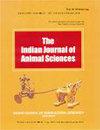Molecular analysis of NS1 gene of Indian protoparvoviruses
IF 0.3
4区 农林科学
Q4 AGRICULTURE, DAIRY & ANIMAL SCIENCE
引用次数: 0
Abstract
Porcine parvovirus (PPV) is a predominant infectious agent responsible for infertility in pigs. Globally, it leads to colossal economic loss to the pig rearing communities, especially in the developing countries. The nonstructural gene 1 (NS1) of PPV is responsible for the virus replication, transcription regulation and cytotoxicity. Variations in the NS1 gene could cause increased virulence of the virus and the enhanced virulence raises concern about the effectiveness of the PPV vaccines against newly emerging strains. So, in the present study, we collected 84 samples from different regions of Punjab and Guwahati (Assam) during 2019-2022. Out of 84 samples, 12samples were positive for PPV-1. The NS1 gene was cloned and sequenced followed by analysis of Indian PPV-1 isolates to understand its evolutionary background, level of divergence and nucleotide/amino acid substitutions. The findings revealed that Indian PPV-1 isolates exhibit nucleotide substitutions with high percent sequence identity. Pairwise distance matrix values of the NS1 gene revealed that local PPV-1 isolates showed maximum divergence from sequences of Brazil, China, Korea and Germany. Furthermore, selection pressure analysis revealed that all the isolates were under positive selection. The findings of the current study warrant whole genome analysis of circulating PPVs in India to identify a putative vaccine strain for combating emerging PPVs.印度原细小病毒NS1基因的分子分析
猪细小病毒(PPV)是导致猪不育的主要传染因子。在全球范围内,它给养猪业造成了巨大的经济损失,特别是在发展中国家。PPV的非结构基因1 (NS1)负责病毒的复制、转录调控和细胞毒性。NS1基因的变异可能导致病毒的毒力增强,而这种增强的毒力引起了人们对PPV疫苗对新出现的毒株的有效性的关注。因此,在本研究中,我们在2019-2022年期间从旁遮普和古瓦哈蒂(阿萨姆邦)的不同地区收集了84个样本。84份样品中,12份样品PPV-1阳性。对印度PPV-1分离株的NS1基因进行克隆和测序,了解其进化背景、分化水平和核苷酸/氨基酸取代情况。结果表明,印度PPV-1分离株表现出核苷酸替换,序列一致性高。NS1基因的成对距离矩阵值显示,PPV-1本地分离株与巴西、中国、韩国和德国的序列差异最大。选择压力分析表明,所有分离株均处于正选择状态。当前研究的发现证明了对印度流行的ppv进行全基因组分析,以确定一种假定的疫苗株,用于对抗新出现的ppv。
本文章由计算机程序翻译,如有差异,请以英文原文为准。
求助全文
约1分钟内获得全文
求助全文
来源期刊

Indian Journal of Animal Sciences
农林科学-奶制品与动物科学
CiteScore
0.60
自引率
25.00%
发文量
220
审稿时长
8 months
期刊介绍:
Articles published in The Indian Journal of Animal Sciences encompass a broad range of research topics in animal health and production related to cattle, buffalo, sheep, goat, camel, equines, pig, rabbit, yak, mithun, poultry and fisheries. Studies involving wildlife species and laboratory animal species that address fundamental questions about their biology will also be considered for publication. All manuscripts must present some new development and must be original, timely, significant and scientifically excellent. Papers will be rejected if standards of care of, or procedures performed on animals are not up to those expected of humane veterinary scientists. At a minimum, standards must meet the International Guiding Principles for Biomedical Research involving Animals, as issued by the Council for International Organizations of Medical Sciences. (C.I.O.M.S., c/o WHO, CH 1211 Geneva 27, Switzerland). Articles reporting new animal disease must follow GOI directive as given in detail in Guidelines to Authors.
 求助内容:
求助内容: 应助结果提醒方式:
应助结果提醒方式:


